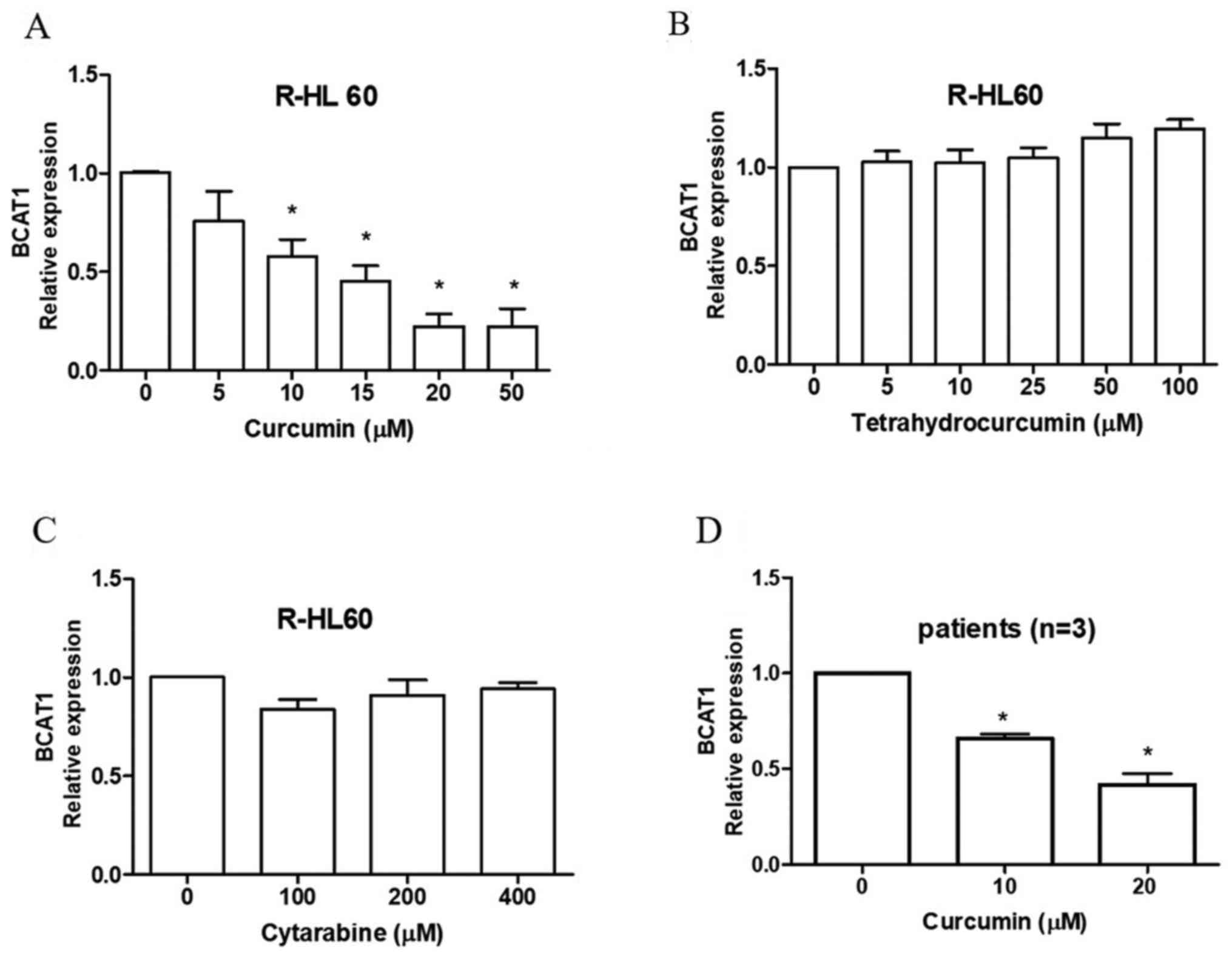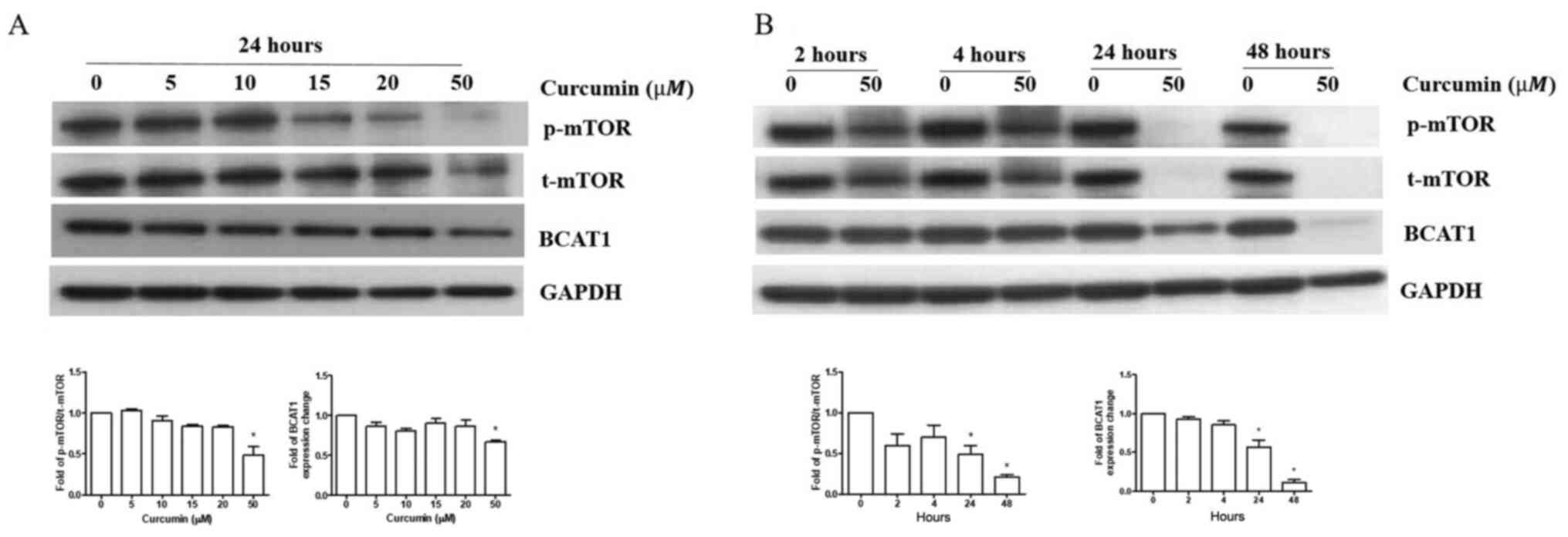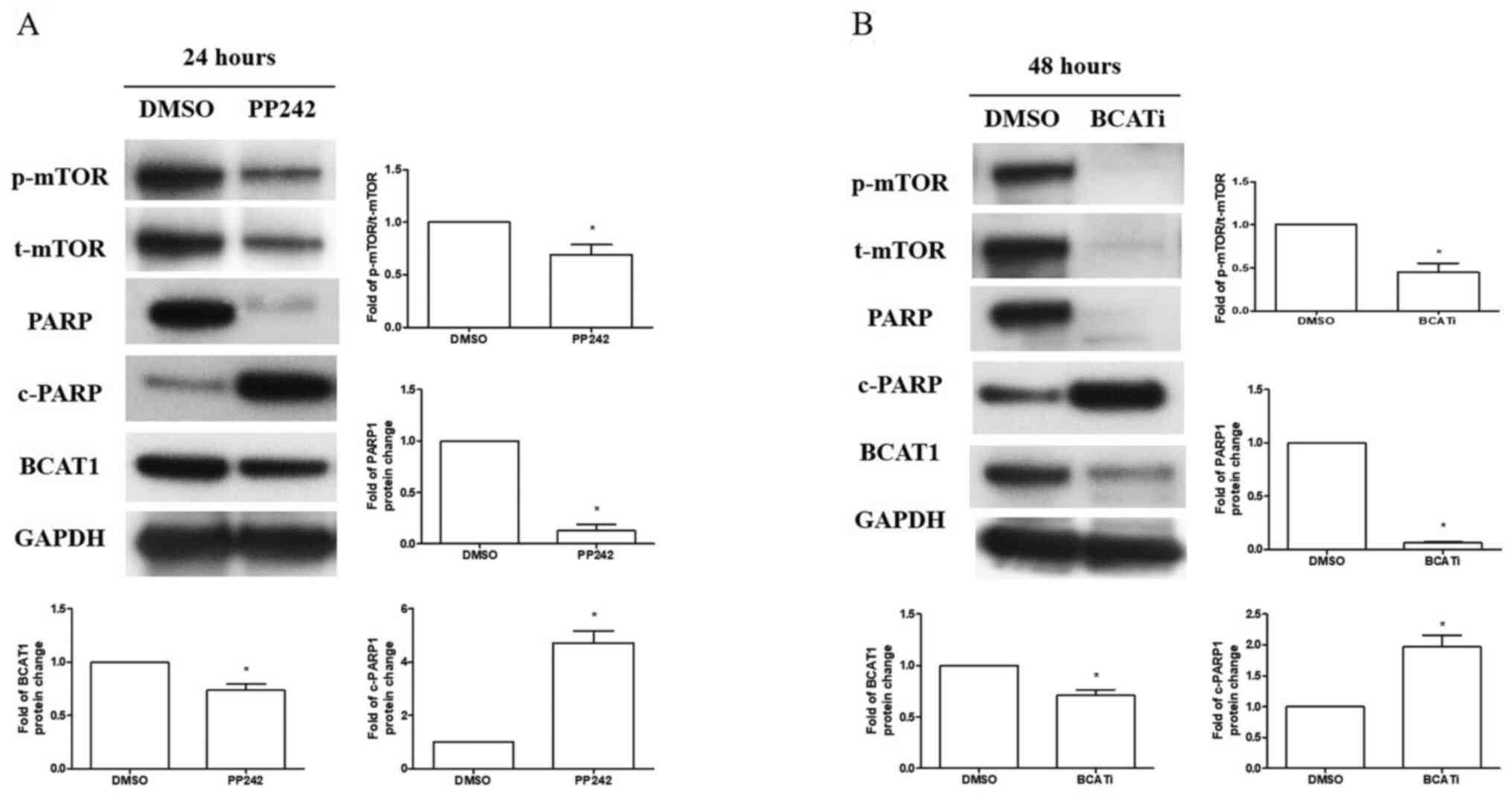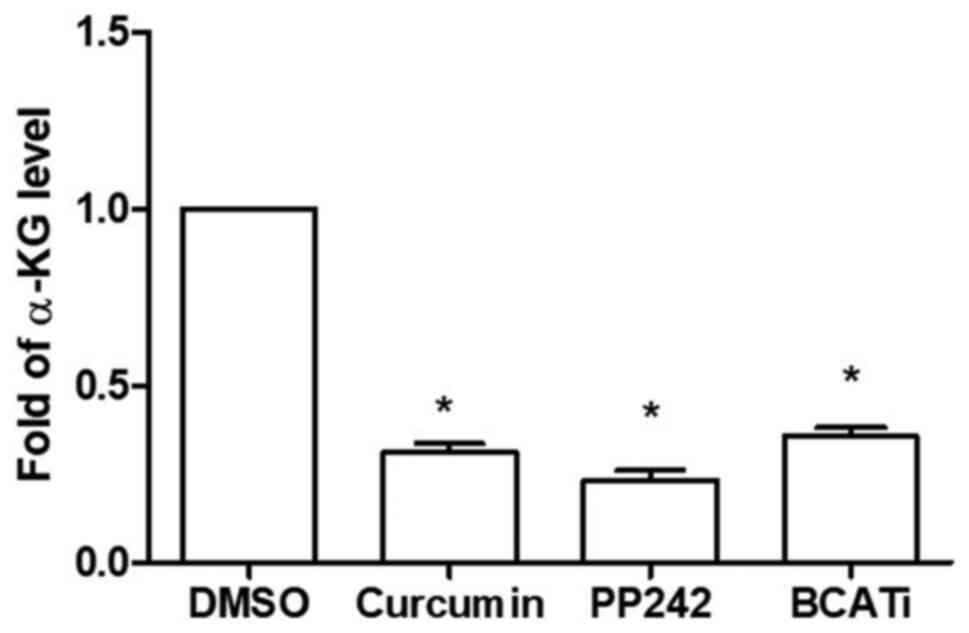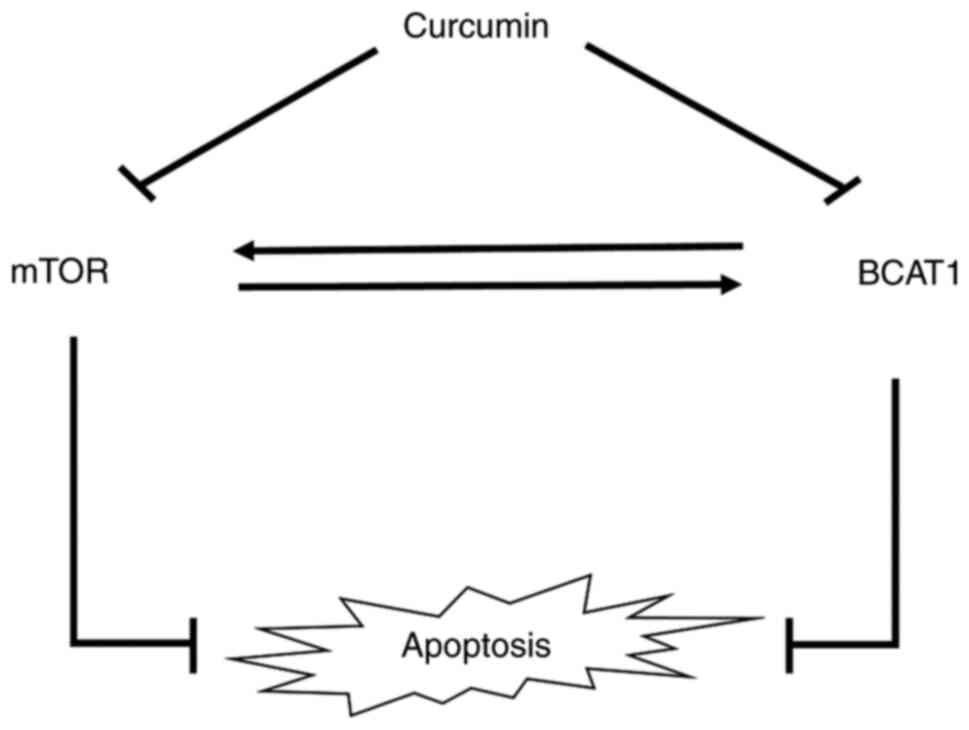|
1
|
Madhusoodhan PP, Carroll WL and Bhatla T:
Progress and prospects in pediatric leukemia. Curr Probl Pediatr
Adolesc Health Care. 46:229–241. 2016. View Article : Google Scholar : PubMed/NCBI
|
|
2
|
Lyengar V and Shimanovsky A: Leukemia.
StatPearls StatPearls Publishing Copyright © 2021. StatPearls
Publishing LLC.; Treasure Island, FL: 2021
|
|
3
|
Liu N, Wang C, Wang L, Gao L, Cheng H,
Tang G, Hu X and Wang J: Valproic acid enhances the antileukemic
effect of cytarabine by triggering cell apoptosis. Int J Mol Med.
37:1686–1696. 2016. View Article : Google Scholar : PubMed/NCBI
|
|
4
|
Tseng YH, Chiou SS, Weng JP and Lin PC:
Curcumin and tetrahydrocurcumin induce cell death in
Ara-C-resistant acute myeloid leukemia. Phytother Res.
33:1199–1207. 2019. View
Article : Google Scholar : PubMed/NCBI
|
|
5
|
Lee TY and Tseng YH: The potential of
phytochemicals in oral cancer prevention and therapy: A review of
the evidence. Biomolecules. 10:11502020. View Article : Google Scholar : PubMed/NCBI
|
|
6
|
Kouhpeikar H, Butler AE, Bamian F, Barreto
GE, Majeed M and Sahebkar A: Curcumin as a therapeutic agent in
leukemia. J Cell Physiol. 234:12404–12414. 2019. View Article : Google Scholar : PubMed/NCBI
|
|
7
|
Song X, Zhang M, Dai E and Luo Y:
Molecular targets of curcumin in breast cancer (Review). Mol Med
Rep. 19:23–29. 2019.PubMed/NCBI
|
|
8
|
Holeček M: Branched-chain amino acids in
health and disease: Metabolism, alterations in blood plasma, and as
supplements. Nutr Metab (Lond). 15:332018. View Article : Google Scholar
|
|
9
|
Neinast M, Murashige D and Arany Z:
Branched chain amino acids. Annu Rev Physiol. 81:139–164. 2019.
View Article : Google Scholar : PubMed/NCBI
|
|
10
|
Mayers JR, Wu C, Clish CB, Kraft P,
Torrence ME, Fiske BP, Yuan C, Bao Y, Townsend MK, Tworoger SS, et
al: Elevation of circulating branched-chain amino acids is an early
event in human pancreatic adenocarcinoma development. Nat Med.
20:1193–1198. 2014. View
Article : Google Scholar : PubMed/NCBI
|
|
11
|
Watanabe A, Higashi T, Sakata T and
Nagashima H: Serum amino acid levels in patients with
hepatocellular carcinoma. Cancer. 54:1875–1882. 1984. View Article : Google Scholar : PubMed/NCBI
|
|
12
|
Li Z and Zhang H: Reprogramming of
glucose, fatty acid and amino acid metabolism for cancer
progression. Cell Mol Life Sci. 73:377–392. 2016. View Article : Google Scholar : PubMed/NCBI
|
|
13
|
Sun H, Zhou Y, Skaro MF, Wu Y, Qu Z, Mao
F, Zhao S and Xu Y: Metabolic reprogramming in cancer is induced to
increase proton production. Cancer Res. 80:1143–1155. 2020.
View Article : Google Scholar : PubMed/NCBI
|
|
14
|
DeBerardinis RJ and Chandel NS:
Fundamentals of cancer metabolism. Sci Adv. 2:e16002002016.
View Article : Google Scholar : PubMed/NCBI
|
|
15
|
Zeng B, Zhang X, Zhao J, Wei Z, Zhu H, Fu
M, Zou D, Feng Y, Luo H and Lei Y: The role of
DNMT1/hsa-miR-124-3p/BCAT1 pathway in regulating growth and
invasion of esophageal squamous cell carcinoma. BMC Cancer.
19:6092019. View Article : Google Scholar : PubMed/NCBI
|
|
16
|
Xu Y, Yu W, Yang T, Zhang M, Liang C, Cai
X and Shao Q: Overexpression of BCAT1 is a prognostic marker in
gastric cancer. Human Pathol. 75:41–46. 2018. View Article : Google Scholar : PubMed/NCBI
|
|
17
|
Zhang L and Han J: Branched-chain amino
acid transaminase 1 (BCAT1) promotes the growth of breast cancer
cells through improving mTOR-mediated mitochondrial biogenesis and
function. Biochem Biophys Res Commun. 486:224–231. 2017. View Article : Google Scholar : PubMed/NCBI
|
|
18
|
Zheng YH, Hu WJ, Chen BC, Grahn TH, Zhao
YR, Bao HL, Zhu YF and Zhang QY: BCAT1, a key prognostic predictor
of hepatocellular carcinoma, promotes cell proliferation and
induces chemoresistance to cisplatin. Liver Int. 36:1836–1847.
2016. View Article : Google Scholar : PubMed/NCBI
|
|
19
|
Hattori A, Tsunoda M, Konuma T, Kobayashi
M, Nagy T, Glushka J, Tayyari F, McSkimming D, Kannan N, Tojo A, et
al: Cancer progression by reprogrammed BCAA metabolism in myeloid
leukaemia. Nature. 545:500–504. 2017. View Article : Google Scholar : PubMed/NCBI
|
|
20
|
Raffel S, Falcone M, Kneisel N, Hansson J,
Wang W, Lutz C, Bullinger L, Poschet G, Nonnenmacher Y, Barnert A,
et al: BCAT1 restricts αKG levels in AML stem cells leading to
IDHmut-like DNA hypermethylation. Nature. 551:384–388. 2017.
View Article : Google Scholar : PubMed/NCBI
|
|
21
|
Tönjes M, Barbus S, Park YJ, Wang W,
Schlotter M, Lindroth AM, Pleier SV, Bai AHC, Karra D, Piro RM, et
al: BCAT1 promotes cell proliferation through amino acid catabolism
in gliomas carrying wild-type IDH1. Nat Med. 19:901–908. 2013.
View Article : Google Scholar
|
|
22
|
Fox DB and Alvarez JV:
Epithelial-to-mesenchymal transition activates Bcat1 expression to
promote recurrent tumor growth. bioRxiv. Dec 9–2020.(Epub ahead of
print). doi: 10.1101/2020.12.08.416479.
|
|
23
|
Gu Z, Liu Y, Cai F, Patrick M, Zmajkovic
J, Cao H, Zhang Y, Tasdogan A, Chen M, Qi L, et al: Loss of EZH2
reprograms BCAA metabolism to drive leukemic transformation. Cancer
Discov. 9:1228–1247. 2019. View Article : Google Scholar : PubMed/NCBI
|
|
24
|
Chiarini F, Evangelisti C, McCubrey JA and
Martelli AM: Current treatment strategies for inhibiting mTOR in
cancer. Trends Pharmacol Sci. 36:124–135. 2015. View Article : Google Scholar : PubMed/NCBI
|
|
25
|
Cargnello M, Tcherkezian J and Roux PP:
The expanding role of mTOR in cancer cell growth and proliferation.
Mutagenesis. 30:169–176. 2015. View Article : Google Scholar : PubMed/NCBI
|
|
26
|
Villar VH, Nguyen TL, Delcroix V, Terés S,
Bouchecareilh M, Salin B, Bodineau C, Vacher P, Priault M,
Soubeyran P and Durán RV: mTORC1 inhibition in cancer cells
protects from glutaminolysis-mediated apoptosis during nutrient
limitation. Nat Commun. 8:141242017. View Article : Google Scholar : PubMed/NCBI
|
|
27
|
Tamaddoni A, Mohammadi E, Sedaghat F,
Qujeq D and As'Habi A: The anticancer effects of curcumin via
targeting the mammalian target of rapamycin complex 1(mTORC1)
signaling pathway. Pharmacol Res. 156:1047982020. View Article : Google Scholar : PubMed/NCBI
|
|
28
|
Tan HK, Moad AI and Tan ML: The mTOR
signalling pathway in cancer and the potential mTOR inhibitory
activities of natural phytochemicals. Asian Pac J Cancer Prev.
15:6463–6475. 2014. View Article : Google Scholar : PubMed/NCBI
|
|
29
|
Patel SS, Acharya A, Ray RS, Agrawal R,
Raghuwanshi R and Jain P: Cellular and molecular mechanisms of
curcumin in prevention and treatment of disease. Crit Rev Food Sci
Nutr. 60:887–939. 2020. View Article : Google Scholar : PubMed/NCBI
|
|
30
|
Pösel C, Möller K, Fröhlich W, Schulz I,
Boltze J and Wagner DC: Density gradient centrifugation compromises
bone marrow mononuclear cell yield. PLoS One. 7:e502932012.
View Article : Google Scholar
|
|
31
|
Arber DA and Erba HP: Diagnosis and
treatment of patients with acute myeloid leukemia with
myelodysplasia-related changes (AML-MRC). Am J Clin Pathol.
154:731–741. 2020. View Article : Google Scholar : PubMed/NCBI
|
|
32
|
Livak KJ and Schmittgen TD: Analysis of
relative gene expression data using real-time quantitative PCR and
the 2(-Delta Delta C(T)) method. Methods. 25:402–408. 2001.
View Article : Google Scholar : PubMed/NCBI
|
|
33
|
Su PF and Song SQ: Regulation of mTOR by
miR-107 to facilitate glioma cell apoptosis and to enhance
cisplatin sensitivity. Eur Rev Med Pharmacol Sci. 22:6864–6872.
2018.PubMed/NCBI
|
|
34
|
Murugan AK: mTOR: Role in cancer,
metastasis and drug resistance. Semin Cancer Biol. 59:92–111. 2019.
View Article : Google Scholar : PubMed/NCBI
|
|
35
|
Watson JL, Hill R, Lee PW, Giacomantonio
CA and Hoskin DW: Curcumin induces apoptosis in HCT-116 human colon
cancer cells in a p21-independent manner. Exp Mol Pathol.
84:230–233. 2008. View Article : Google Scholar : PubMed/NCBI
|
|
36
|
Mishra D, Singh S and Narayan G: Curcumin
induces apoptosis in Pre-B acute lymphoblastic leukemia cell lines
via PARP-1 cleavage. Asian Pac J Cancer Prev. 17:3865–3869.
2016.PubMed/NCBI
|
|
37
|
Zou Z, Tao T, Li H and Zhu X: mTOR
signaling pathway and mTOR inhibitors in cancer: Progress and
challenges. Cell Biosci. 10:312020. View Article : Google Scholar : PubMed/NCBI
|
|
38
|
Eden A and Benvenisty N: Involvement of
branched-chain amino acid aminotransferase (Bcat1/Eca39) in
apoptosis. FEBS Lett. 457:255–261. 1999. View Article : Google Scholar : PubMed/NCBI
|
|
39
|
Rozengurt E, Soares HP and Sinnet-Smith J:
Suppression of feedback loops mediated by PI3K/mTOR induces
multiple overactivation of compensatory pathways: An unintended
consequence leading to drug resistance. Mol Cancer Ther.
13:2477–2488. 2014. View Article : Google Scholar : PubMed/NCBI
|
|
40
|
Tian T, Li X and Zhang J: mTOR signaling
in cancer and mTOR inhibitors in solid tumor targeting therapy. Int
J Mol Sci. 20:7552019. View Article : Google Scholar : PubMed/NCBI
|
|
41
|
Wang Y, Zhang J, Ren S, Sun D, Huang HY,
Wang H, Jin Y, Li F, Zheng C, Yang L, et al: Branched-chain amino
acid metabolic reprogramming orchestrates drug resistance to EGFR
tyrosine kinase inhibitors. Cell Rep. 28:512–525.e6. 2019.
View Article : Google Scholar : PubMed/NCBI
|
|
42
|
Gan L, Li C, Wang J and Guo X: Curcumin
modulates the effect of histone modification on the expression of
chemokines by type II alveolar epithelial cells in a rat COPD
model. Int J Chron Obstruct Pulmon Dis. 11:2765–2773. 2016.
View Article : Google Scholar : PubMed/NCBI
|
|
43
|
Yan X, Pan B, Lv T, Liu L, Zhu J, Shen W,
Huang X and Tian J: Inhibition of histone acetylation by curcumin
reduces alcohol-induced fetal cardiac apoptosis. J Biomed Sci.
24:12017. View Article : Google Scholar : PubMed/NCBI
|
|
44
|
Laribee RN and Weisman R: Nuclear
functions of TOR: Impact on transcription and the epigenome. Genes
(Basel). 11:6412020. View Article : Google Scholar : PubMed/NCBI
|
|
45
|
Viscarra JA, Wang Y, Nguyen HP, Choi YG
and Sul HS: Histone demethylase JMJD1C is phosphorylated by mTOR to
activate de novo lipogenesis. Nat Commun. 11:7962020. View Article : Google Scholar : PubMed/NCBI
|
















